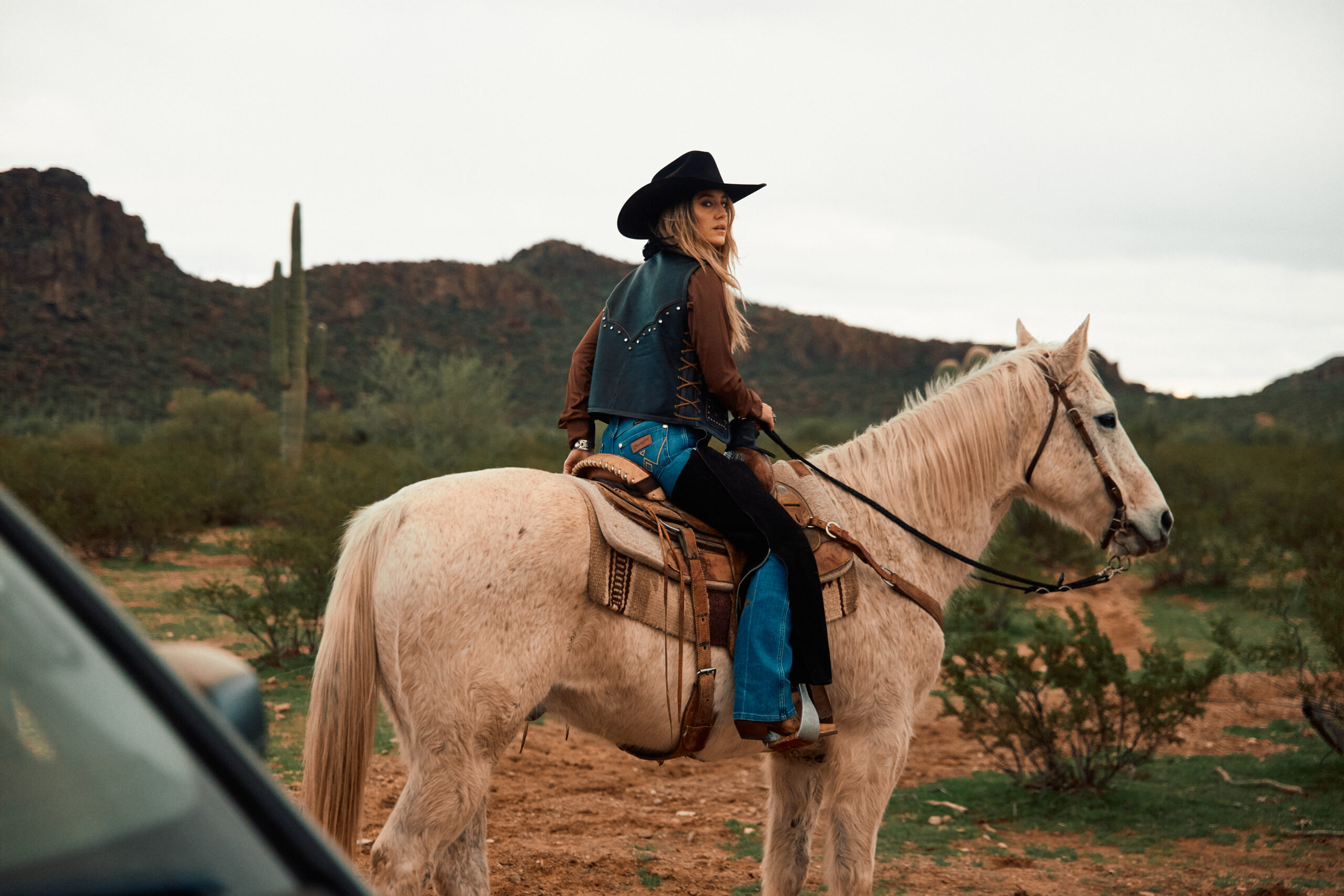Daniel Cain grew up with music in his soul but it took him going home to find his voice.
Daniel Cain is a singer-songwriter based deep in the roots of his Appalachian heritage. His story is not the typical path that musicians take to success. It’s been filled with plenty of twists and turns that he’s relied on faith to guide him through. A similar theme you’ll find throughout this interview is that sometimes the thing that we are seeking the most isn’t actually where we are headed or even end up. Daniel wasn’t on a path to becoming a musician, but the cards he was dealt told a different story. Now, I’m thrilled to be able to share that story with you. Enjoy!
What was it like growing up in a musically inclined family? Were you encouraged to pursue music as a career?
I guess it was pretty musical ha! My dad ran a guitar store, and he was also a regional musician. My mom sang in the choir. So, music was definitely part of my life but my parents often nudged I shouldn’t pursue a career in music. Mom was a career educator, so naturally I was encouraged to focus on academics. I remember my dad would say things like, “You’ve got so many other options than being a musician, son.” My dad, who was my hero despite being tough, was ironically the same person telling me not to pursue it, which was always hard for me to accept.
I started playing guitar for fun in middle school. I had a natural talent for it—I could figure out how to play something in a day, but I never stuck with it, probably because of the conflicting messages I received growing up. Then, during my first year of college, I injured my shoulder while training in track and field, which led me to start playing guitar seriously for the first time without any external influence. That’s when I realized how much I truly loved it—at that time, it was like a closeted dream to be a musician.
My alma mater allowed me to study abroad in Europe, and it was there that I was asked to join a band by a foreign exchange student at the same school. She heard my voice and asked, “Are you American?” When I said yes, she invited me to be in her band and sing some covers by The Doors, The Kinks, and maybe the Stones, but I can’t remember all that well.
It was a pivotal moment for me—my first time singing on stage was actually in England out of all places for a satellite kid from rural Kentucky. I was shy and timid, but the English audience wasn’t shy at all about telling me to be more confident. After that experience, I was fired up about pursuing music. When I returned to Kentucky, I joined the school’s Kentucky Folk Ensemble. It was during that time that I gained a great music mentor in the director of the group and played my first song as an aspiring singer/songwriter for an audience.
After college, I decided in my heart to pursue music in career, but I didn’t have any money and wasn’t sure how to get started. I saved money for a year bartending and serving and eventually moved to Nashville with a couple thousand dollars to follow my dream.

Can you describe what it was like for you to find your unique voice and place in the country music industry?
It was not a linear path. When I moved to Nashville, I ran out of money within two months. In my time there, I never got on stage and ended up working three jobs for about two years just to get by. Then 2020 came around, and everything changed for me. Up until then, I had been making rap beats on my computer at home and had dabbled in music, like participating in the Kentucky Folk Ensemble, as I mentioned above, and then my short stint singing with the cover band in England. But that was the extent of my musical expression up until that point.
2020 began with recent heartbreak, a high dose of lonesome, and with seemingly no real friends around—just me, my dog Biggie, and my guitar. Then, in February, my grandma passed away, and a month later, the East Nashville tornado hit my house. Ten days after that, COVID hit, and suddenly, my part-time job hours were cut, and I was displaced from my home. Everything felt chaotic—my world was falling apart. Then to top all of that off, I got a call from my mom telling me that my dad was just diagnosed with terminal cancer. He and I weren’t really seeing eye to eye in life, but when I got that news, everything changed. I can still remember the day my dad got that diagnosis. I walked outside, and the whole world just went gray. The color of the world literally just left my eyes. It was a surreal moment, and it was there I pretty much realized I had to grow up and make some big changes.
I ended up moving back to Kentucky to be closer to my family. I decided to focus on smoothing out rough ends with my dad until the end. That decision was transformative for me—it made me dig into my roots. I’m a child of the digital age, born in 1995, but I also have a deep Scots-Irish Appalachian heritage in my last name, Cain, given to me by my daddy, Jeff Cain. It was something I used to be really ashamed of. The world really did that to me as a kid. But when my dad got sick, I realized I had a responsibility to learn about my heritage and embrace who I really am.
One pivotal moment was when I was sitting on the back porch playing an old “Mother” Maybelle Carter song, “Wildwood Flower,” on the guitar. My dad joined in, and we recorded a video—it was the last time we played together. Afterward, he asked me, “Why haven’t you worked up a set yet?” That was the moment I realized I had always sought his approval, even if I resented him at times. I didn’t want to fight him to do what I wanted; I wanted his support. That moment lit a fire in me, and I started working on music with intense focus from that point forward.
By October 2020, I did my first open mic show at Austin City Saloon in Lexington, Kentucky. I played three songs, and afterward, someone came up to me, asking who I was. That small moment felt just about as good if not better than any bigger performance I’ve done since. It was like that first time successful feeling that you just keep chasing. It led to more opportunities—my first opening slot at another venue, and eventually, my own show. By January 2021, I was fully committed to becoming a full-time performer.
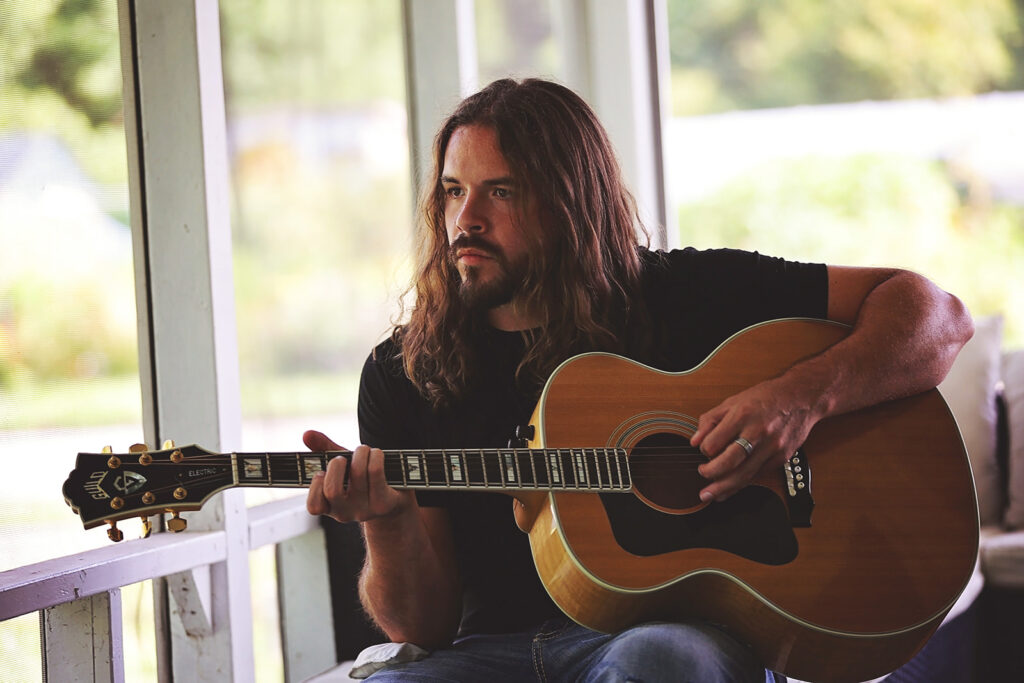
In another interview, you mentioned that “God gives us our talents to share with others; if anything, it is selfish when we do not.” How has this philosophy shaped your decisions in your career?
Well, I think this philosophy has been something I’ve relied on to get over so many fears and anxieties that stop me in my tracks, almost daily. Usually, reminding myself of who put me here and gave me this hand also gives me perspective to see that the things stopping me are rooted in the wrong reasons to even do this in the first place. Fears of being rejected, aka the need to be validated by others. That’s a battle you’ll never win. People can never be enough to fill that void. Only God. My opinion is that we all have a God-sized hole. And so, if you can look at your natural talents as a gift from God, then you see how expressing those for others isn’t necessarily to be accepted or not by them. Not for vanity. Not for self-righteousness. It’s a gift from God for you and for others. It’s to please God, hopefully others as well, and that pleases me. Make a joyful noise.
I try my best to make sure I’m spiritually convicted in my decisions. It’s led to a unique, one-on-one path with God. That path doesn’t always have to be something society deems spectacular. Even if it were something seemingly undesirable —a job some might look down on—it wouldn’t matter to me, because if that’s the path God has for me, then that’s the path I’ll take, and I’ll hopefully make a positive impact on others along the way.
My decisions are shaped by free thought, meditation, prayer, and spiritual conviction. Often, they seem unconventional but somehow, they always lead me to where I need to be. I like to say, “Wherever you go, there you are.”
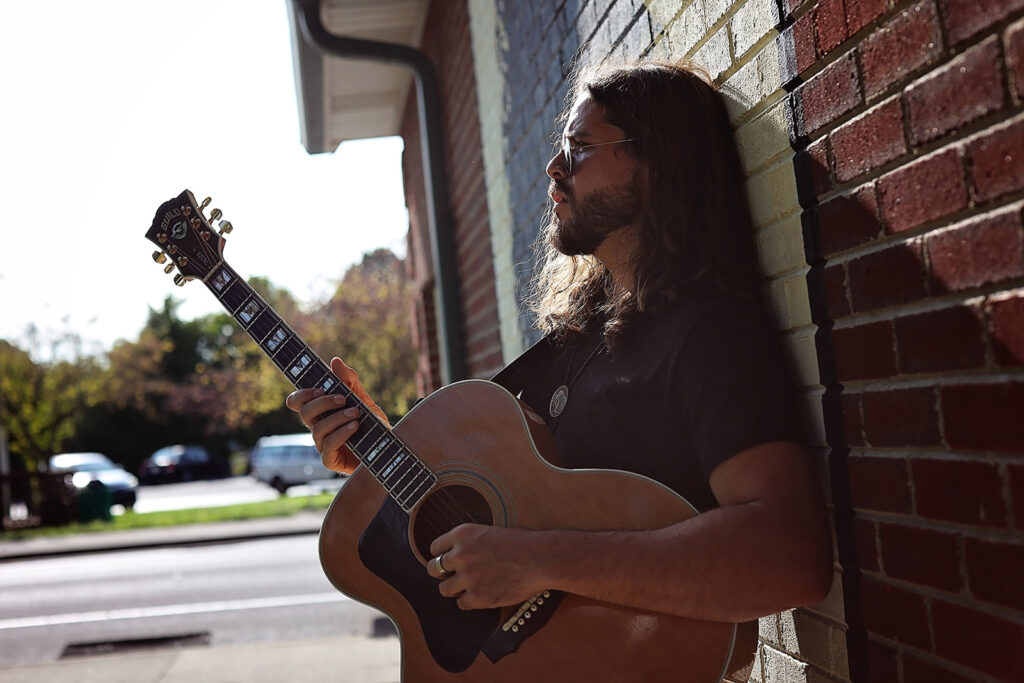
Are there any artists that you’ve drawn inspiration from?
My biggest inspiration is my dad. He lived life on his own terms, working for himself and finding fulfillment in the small things. Growing up around him and his love for music shaped me deeply—not just in style, but in approach to this life as a whole.
Musically, I’ve had many influences over the years, ranging from Elvis, Led Zeppelin, and The Beatles to post-grunge bands like Nirvana. I mean really, I have a new hyper-fixation at least weekly with a band, genre, decade, you name it. Music to me is like Willy Wonka’s never-ending gob-stopper. When I first started open-mics, artists like Charlie Crockett, who captures the modern cowboy lifestyle, really resonated with me. His song “Welcome to Hard Times” came out in 2020, and it struck a chord. I also leaned on Mac Miller songs during that time, and worked up my own rendition of “Good News” which helped me develop my skills.
In the Lexington scene, Tyler Childers had a big influence on me, especially in how he writes about the harsh realities of Appalachian life. Other Kentucky legends like Sturgill Simpson and Chris Stapleton have also inspired me with their commitment to doing things their way. In general, they all hit me like a brick when I was going deeper into finding who I am in the lens of my heritage and trying to accept what I was born into.
Lately, my ears have been drawn to rock and roll and the more-so acoustic grunge of the ’90s. My goal is to blend all my influences however and whenever I want—rock, blues, folk, classic country, bluegrass, you name it—into something unique, without ever compromising my own voice or poetic expression. Really just whatever moves me, I want to breathe something back out into the world that amplifies that.
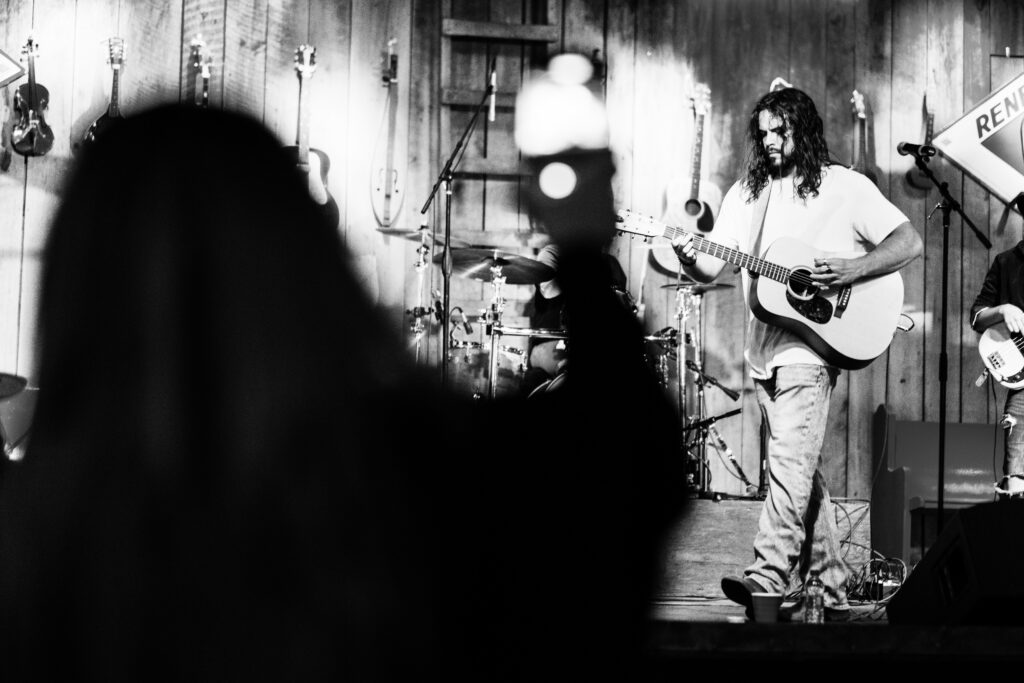
Photo By: Larry Walters
Music is a form of connecting and telling stories. How do you incorporate storytelling into what you do and the music you create?
As a solo artist, I like to make each show unique. Jimi Hendrix is one of my idols because he never played a song the same way twice. When I’m on stage, I try my best to be true to how I feel that night.
When it’s just me and my guitar, especially at a listening-room venue, I enjoy telling stories about how my songs came to be, either before or after playing them. Storytelling is a big part of my solo performances.
Then, in my songwriting, I focus on creating songs with a message or a story. Almost all my songs are autobiographical for now, so I can always explain how they were inspired, why I wrote them, and the events behind the lyrics.

Photo by: Fisher Flynn
When people see you perform live, listen to your music, and watch your videos, what do you hope they come away with?
Music is both healing for me and a way to give others something meaningful. I want to create music that makes people reflect and provides them with something to lean on. Someone once said, “You can either pacify or electrify with your music.” I aim to do both in a positive way—pacify those who are negatively charged and electrify those who are feeling down. I also make music to find purpose for myself, as I’m naturally inclined to want to help others. Ultimately, I just want to serve people through my music and give people something to identify with.
You have a six-song EP that came out on June 14th, can you tell us a little more about that collection?
I recorded about 9-10 songs out in the hills of West Virginia over the past year with my friend John Price of Appalachia Untold, a channel he created to spotlight original songwriters from our region. I decided to pick out 6 of those songs and put them together as an EP called Appalachia Untold Sessions. It’s an acoustic EP recorded on field microphone just live, raw, and uncut as you can make it. Those birds in the background are the real thing and they just happened to do a great job singin’ background harmonies that day.
The album I’m working on is called Songs for My Father. If I’m blessed to live a long, healthy life and have a lasting career, I’ll always be proud that this is my first album. Unlike my acoustic EP, it will be a full-production album with a complete band.
Before I decided to pursue music as a full-time career, my initial goal was simply to play songs for my father while he was sick, to give him something to vicariously live through. Our family is doing okay, but we’re not wealthy I wouldn’t say, and my dad doesn’t have a gravestone yet, which has weighed heavily on me. I feel spiritually convicted that this album, at the very least, will serve as a personal gravestone for him. If I can share that with the world, it would mean a lot.
The idea in one sense is truly have a gift for him that I’m hoping he can somehow see and hear. In another sense, it’s to reflect how he influenced the sound you hear from me. It’s like saying, “This is my heritage; I’m a chip off the old block.” The music is the next generation of what my dad might have put out if he had released albums.
I think we’ve seen a surge of people turning away from mainstream country and more to music that means something and touches people differently. What are your thoughts on this shift?
It’s been both refreshing and inspiring. Before this surge combined with the divine timing of my own personal journey, I don’t know if I’d have ever felt an opportunity to take a stand in this approach to playing music. Early on, I felt this sense of opportunity to be myself, especially with the spotlight being put on my region by artists like Tyler Childers and Sturgill Simpson.
I do have mixed feelings about it. While it’s true that this attention is a good thing, I’ve seen what happens when a movement becomes too popular. It happened with grunge, which started with bands like Soundgarden and Nirvana but got watered down by label-created bands until it’s just a caricature of the real thing and it spoils and fades. The same thing happened with punk. Arguably it’s happened over and over with every good musical movement really. When a genre becomes oversaturated, it often loses its authenticity and fades away. That’s one thing I do not want to be apart of.
I fear that the same thing is happening now with the current sentiment, where anti-pop is becoming pop. Once something becomes mainstream, it risks losing its essence that gave it the critical attention in the first place. That’s why I try not to define my identity too closely with what genre I’m involved in at the moment. The artists who endure, like Johnny Cash, transcended trends and go through a lot more dark times and times of being laughed off than gets written down on the record when it’s all said and done. He spanned decades because he evolved with the times while also remaining undefinable. While I acknowledge the shift, I also believe that the realness of what’s happening now won’t last forever, at least in this way and it’s important to appreciate it while it does.
You can find Daniel’s latest EP wherever you listen to music. Make sure to also follow Daniel on Facebook and Instagram for updates on his debut album.
Facebook: Daniel Cain
Instagram: @danieltoddcain
Author
-
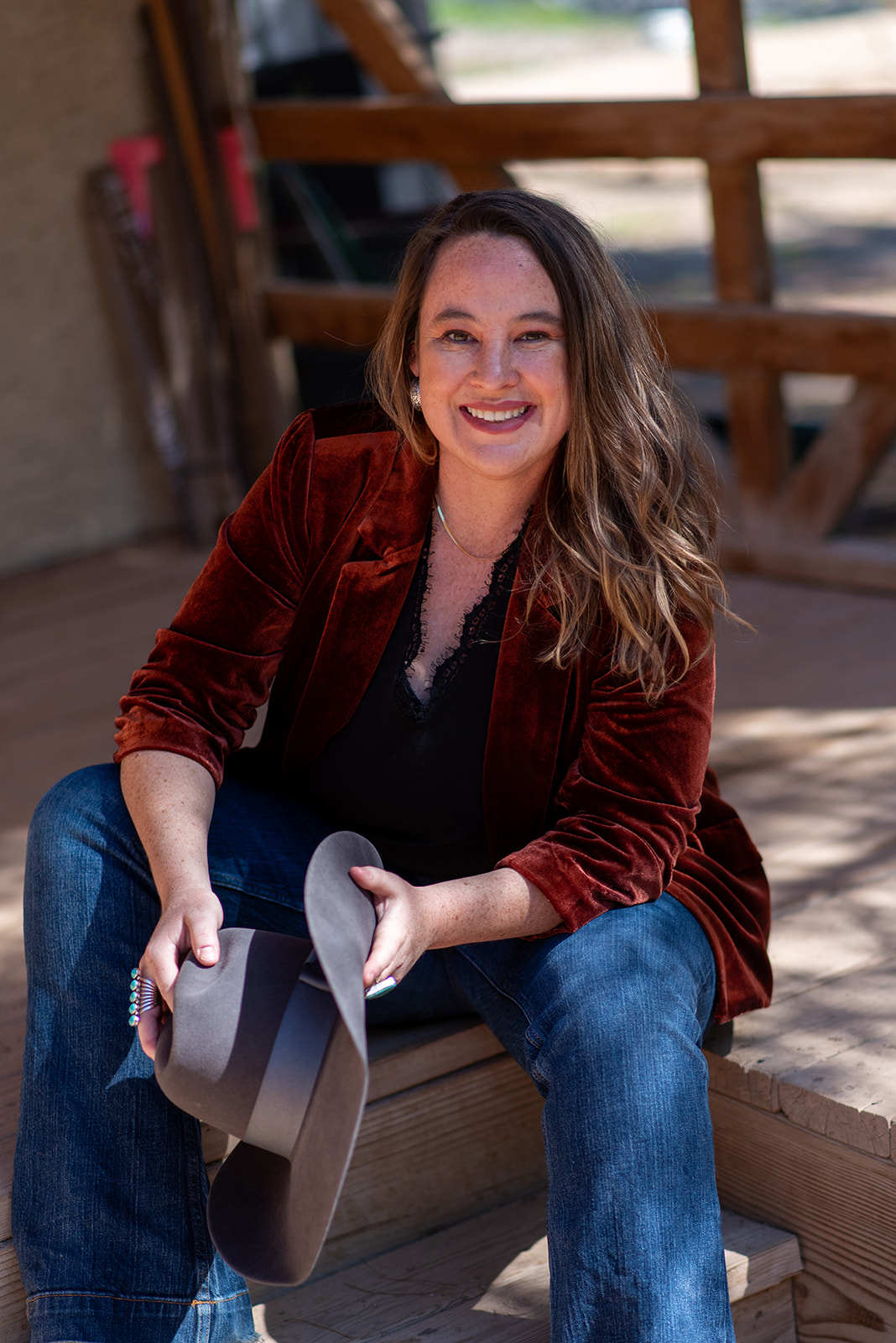
Hi everyone! I'm Krysta Paffrath, I am a proud Arizona native who has a passion for everything business and rodeo. I am beyond thrilled to be the Editor in Chief for Modern Cowboy Magazine and Ten Gallon Talk. My adventurous and entrepreneurial spirit has guided me to work in many places like the WYO Quarter Horse Ranch in Thermopolis, Wyoming, a working cattle ranch in Seligman, Arizona, and many places in between. I am passionate about preserving the western way of life and working with different brands and rodeos to make that happen. If you're looking for a write-up, please shoot me an email at krysta@tengallontalk.com. Learn more about me at krystapaffrath.com. Looking forward to hearing from you!
View all posts









